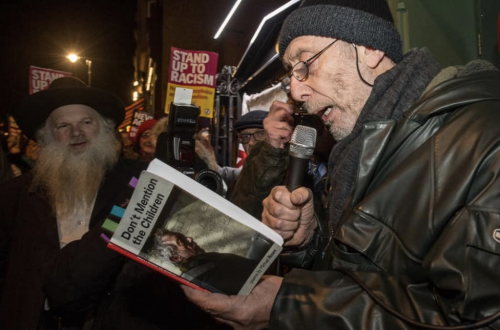This is a guest post by Eyal
It’s a tie – the religious/right bloc is identical to the center/left/arabs bloc with 60 seats each.
Likud – Netanyahu has been severely weakened. He’s still going to be PM (largest party, no real alternative, accepted universally on the right and parts of center), but he took a big blow. Although formally his party is 31 seats, it’s an optical illusion. It’s in-fact a union with Avigdor Liberman’s party. Out of the 31 combined seats, only 20 are “pure” Likud. That’s down from 27 in the current Knesset (and 42 for the combined list). Through the union, campaign mismanagement and overall bad politics, he lost 11 (!) seats. From the starting point of an election he called, and talk of who Netanyahu will “choose” to include in his next coalition, Netanyahu lost seats and is unable to form a coalition on his own terms.
Yesh Atid – a man with no experience, no past, and no real principles. His political agenda is so wide and so vague that it could be almost anything. And yet he was able to collect almost as many seats (19) as the current sitting prime minister. That says something about the situation in Israel, Israeli politics, and the Israeli electorate. I expect him to even go up when the army votes come in (more on that a bit further down).
Labor (or should I say, Labour) – big failure. In the previous elections, with the unpopular Ehud Barak at the helm, and running alongside the (then-) popular Tzipi Livni, Labor took 13 seats. This time, with an unpopular PM, the near-total disappearance of Kadima, no real alternative on the left, the inexperience of Lapid, and against the backdrop of last year’s social protests, Labor netted only 2 seats more. This shows how flawed Shelly Yehimovitch’s campaign strategy was. Early on in the campaign she decided to go only on an economic message and ignore the Israeli/Arab conflict. She even went on as saying that Labor has never been a left wing party, and that this whole dialog is no longer relevant. She expected her base would stay with her while hordes of moderate right-wingers will “cross the street” and vote for Labor. Instead, she lost a large number of lifelong voters to Meretz (myself included), and barely picked up any new ones. A rhesus monkey would have done better.
Meretz – doubled its strength from 3 to 6 seats. But it will still remain a niche left-wing party and won’t join any government headed by Netanyahu.
Army votes – Israeli elections are not quite over yet. There are still several tens of thousands of votes of soldiers, who mostly vote in the bases where they are stationed, and are yet to be counted. This is expected to be finalized late Wednesday or early Thursday. Although it’s not expected to radically change the picture, the speculation is that Lapid will perform very strongly among them, which may even earn him another seat (his 20th), probably at the expense of one of the Arab parties.
What’s next – no one is quite sure. Obviously Likud-Beitenu (31 seats total) and Yesh Atid (19-20) will form the basis of any new coalition. Add to that the remanents of Kadima that barely scraped in (2 seats), and you have about 52-53 seats.
Now this is my own pure speculation, but one of Lapid’s central points is the drafting of religious yeshiva students to the military, an issue which is an absolute no-go with the religious Shas and Yahadut Hatorah parties (11 and 7 seats, respectively), so it’s unlikely that they will join in. Yahadut Hatorah won’t join any coalition that even thinks of drafting the Haredim. Shas might be able to live with some vaguely worded compromise as long as it doesn’t go anywhere. But personally I doubt it.
So that leaves Ha’Bait Hayehudi (headed by Naftali Bennet, 11 seats) and Labor (15). Bringing in the former will make his coalition too right-leaning, and bringing-in the latter will make it too left-leaning. So he will probably strive to bring-in both (~78 seats total) and form a broad government based on economic strategy and support for the “middle-class”, while paying only lip service to the I/P conflict. I expect this will go down as acceptable by both the right (which doesn’t want to see any progress) and the left (because it will validate Labor’s election strategy of ignoring the issue).
From the moment election results are finalized, the newly elected PM has about 2 months (if I recall correctly) to form a coalition, and in recent elections, PM’s have usually taken almost their full time. I expect this time to be no different, and that any final coalition will take at least several weeks to form. Since this is the Middle East, anything can happen until then…
Alexander B in the comments below adds:
One should not forget that Livni’s party was practically Labor II. In such a situation, one finds that Labor votes are actually 22, and not only 15. This was in fact a major success to the Arab parties that increased dramatically their representation, showing that political attacks on their members, especially when having the Neo-nazis of Otzma LeYisrael go free, don’t work at all.
All in all, if we add Hadash to the Left bloc, they increased from 15 to 32 MK’s, duplicating their representation. The Right bloc fell from 50 to 42, while the Haredim just increased by 2, not enougth to compensate the fall of the Right wing. It is then a clear success of the Left, that was perceived all but dead. And while one can argue that Bibi will govern again, one must remember also: Rome was not built in a day. Likewise, the Left has become once more a relevant force to contend with in Israeli politics, especially with the increased international pressures on Bibi to resume negotiations with the Palestinians he doesn’t really want to do.
It is also important to notice that Meretz recieved strong support from young people, particularly students. Likewise other Left wing and Arab parties that received many young voters, unlike Likud Beiteinu. This implies the possible trend of recovery of the Left, making it possible even for a future trend in Israeli politics, especially since it seems the Haredi votes are not increasing due to the dissatisfaction of new generations with parties dominated by a gerousia establishment no-one likes.


